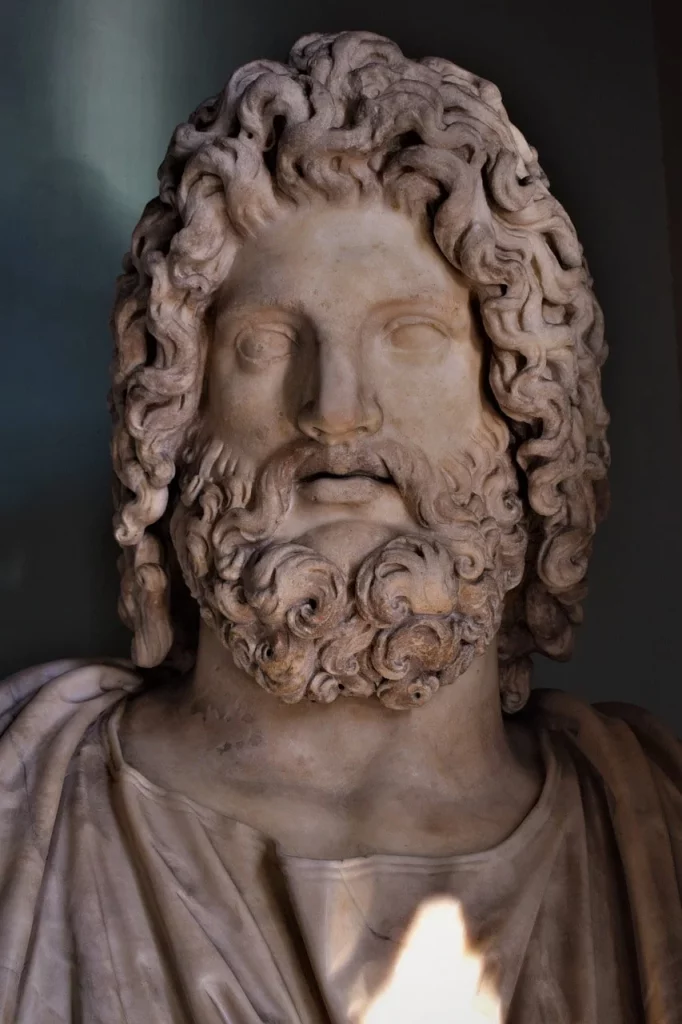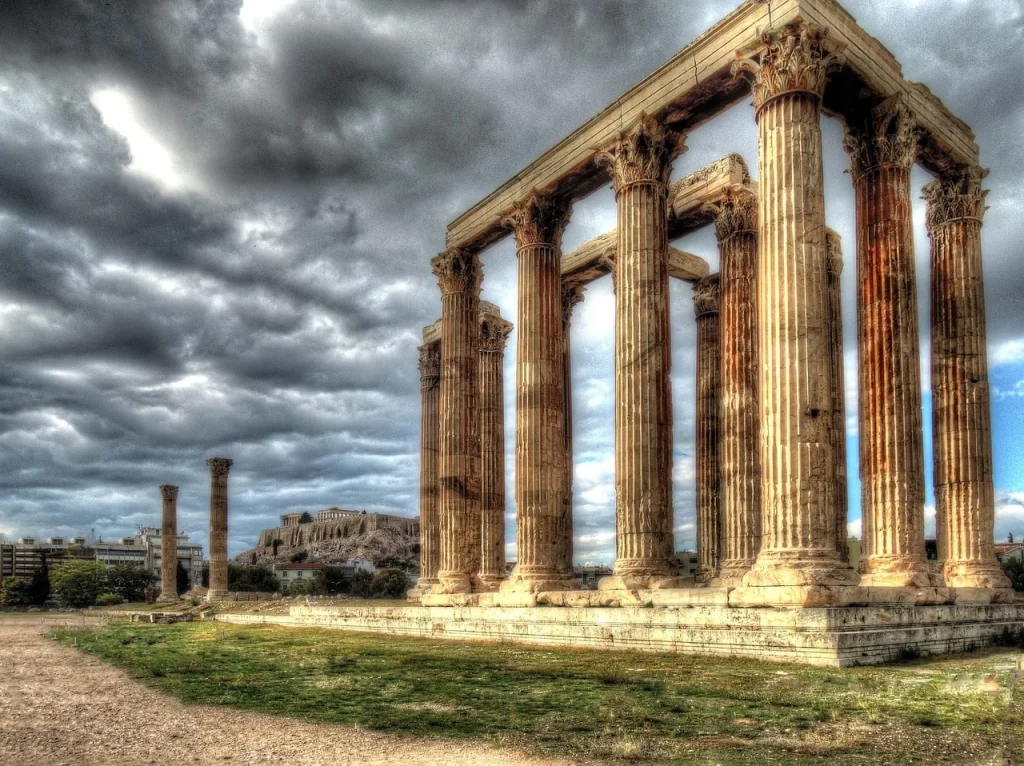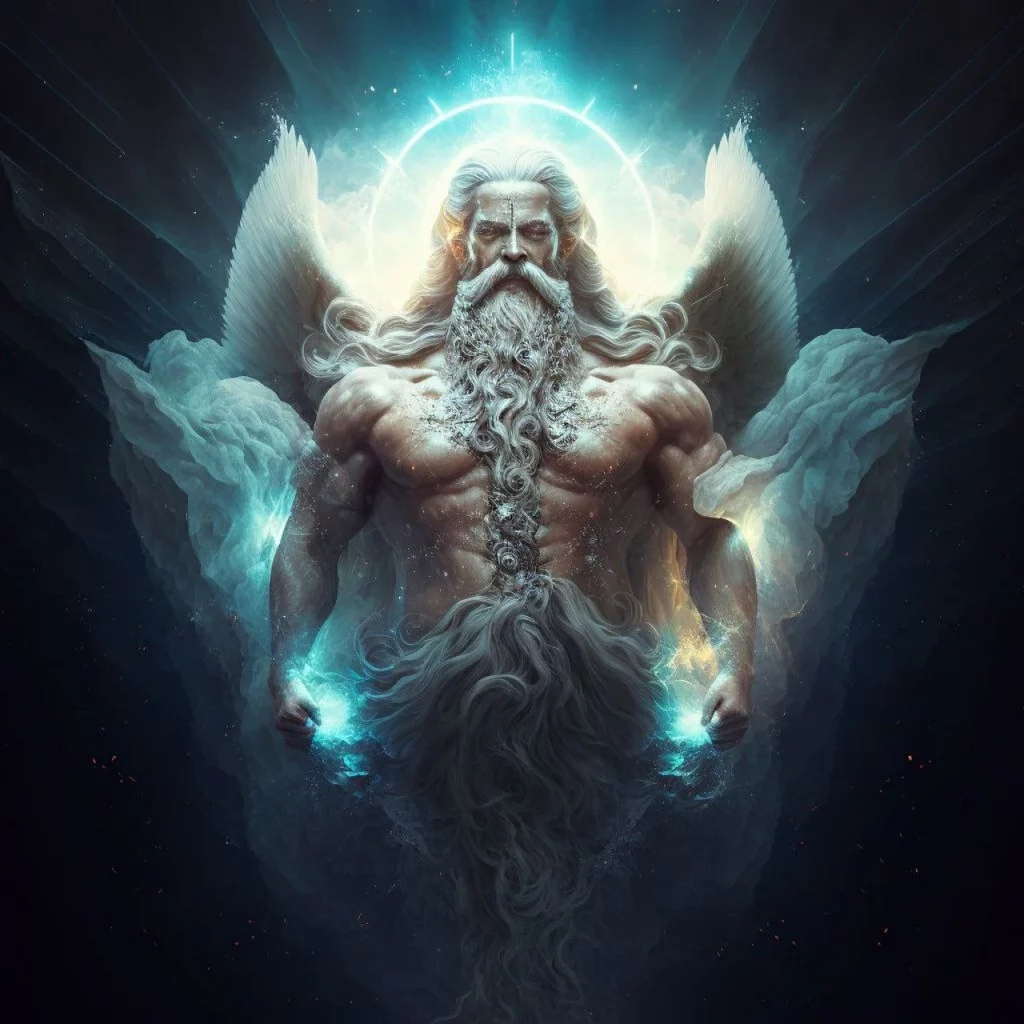When you think of Zeus, you probably picture a mighty bearded guy throwing lightning bolts like a cosmic quarterback. But there’s so much more to the king of the Greek gods than his stormy hobbies.
Zeus is a fascinating character with a knack for leadership, an interesting love life, and the kind of family dynamics that would make anyone’s head spin. He’s been ruling the roost from Mount Olympus, keeping gods and humans in line, and occasionally getting up to some mischief.
Zeus does not bring all men’s plans to fulfillment.
Homer
Zeus Facts
Dive deep into the world of ancient Greek mythology. To test your knowledge and prove your expertise, make sure you pay close attention to every detail, as there’s a quiz awaiting at the end of this article.
- This deity’s birth was shrouded in secrecy to prevent his father, Cronus, from swallowing him, as he had done with his siblings.
- Hidden in a cave on Crete, he was raised by nymphs and the goat Amalthea, symbolizing his connection to nature and earth.
- His thunderbolt, a gift from the Cyclopes, became his most powerful weapon and a symbol of his authority.
- Eagles are often associated with him, seen as messengers or representations of his power and freedom.
- The Olympics were originally held in his honor, reflecting his importance in Greek culture and religion.
- He once engaged in a musical contest with the mortal Pan, showcasing his appreciation for art and competition.
- His oracle at Dodona, known for its sacred oak and whispering pigeons, was one of the oldest in Greece, emphasizing his role as a divine oracle.
- Metis, his first wife, was consumed by him in fear that their offspring would overthrow him, a fate he sought to avoid yet ironically mirrored his own rise to power.
- He took on many forms to seduce mortals and immortals alike, from a golden shower to a swan, showcasing his shape-shifting abilities.
- The Gigantomachy, a battle against the giants, cemented his status as the king of gods and men.
- He assigned the eagle to fetch his thunderbolts and carry his messages, illustrating his control over the natural world.
- Io, one of his lovers, was transformed into a cow to protect her from Hera’s wrath, showcasing his complex relationships and interventions.
- The Aegis, his shield, sometimes bearing the head of Medusa, was a potent symbol of his protection and wrath.

- He fathered Hercules, known for his strength and heroic feats, further extending his legacy into the realm of heroes.
- As a god of hospitality, he emphasized the sacred bond between host and guest, punishing those who violated it.
- Argos, one of his many epithets, highlights his role as a watchful guardian and protector.
- The Nemean Lion, slain by Hercules, was said to be a descendant of his, linking the god to various myths and creatures.
- He was also known as “Xenios Zeus”, the protector of strangers and supplicants, underscoring his jurisdiction over guest-friendship and diplomacy.
- The Fates, daughters of the night, were said to be more powerful than him, as even he could not alter their decrees, underscoring the limits of his power.
- His union with Leto produced Apollo and Artemis, the gods of the sun and moon, showing his role in the balance of natural forces.
- The Rape of Ganymede by him, represented as an eagle, illustrates the fluidity of divine interaction with mortals.
- Prometheus‘ punishment for deceiving him and giving fire to humanity reflects his aspect as a strict enforcer of divine law.
- He was worshipped across the Greek world, from the high peaks of Mount Olympus to the remote colonies of the Greek world.
- The Zeus Trophonios cult emphasized his chthonic and oracular aspects, showing his multifaceted worship practices.
- His beard symbolizes wisdom, maturity, and authority and is often depicted in art and sculpture.
- The Olympian council of gods was presided over by him, reflecting his status as the chief mediator and ruler.
- He granted Paris of Troy the fateful task of judging the most beautiful goddess, indirectly leading to the Trojan War.
- Talaria, the winged sandals of Hermes, were commissioned by him to ensure the swift delivery of divine messages.

- The sacred marriage between him and Hera represents the union of sky and earth, the king and queen of Olympus.
- He released the Titans from Tartarus after they aided him against the Titans, showing his capacity for forgiveness and strategic alliances.
- Lycaon, transformed into a wolf as punishment for attempting to deceive him, highlights his role in establishing moral and ethical standards.
- The Iliad and the Odyssey, epic poems by Homer, frequently invoke his name and favor, underscoring his influence over human affairs.
- He fathered Persephone, queen of the underworld, through Demeter, integrating him further into the cycle of life, death, and rebirth.
- The Altar of Zeus at Pergamon, a monumental construction, showcases the god’s immense significance in Hellenistic culture.
- He was often depicted with a scepter, symbolizing his judicial authority and sovereignty over the cosmos.
- The Muses, goddesses of the arts, were said to sing at his feasts on Olympus, highlighting his patronage of the arts and knowledge.
- Zenith, deriving from his name, signifies the point in the sky directly above, reflecting his omnipresence and supreme power.
- The Ephesian Artemision, one of the Seven Wonders of the Ancient World, was said to have been built to honor his daughter, Artemis.

- His adulterous affairs often led to the birth of important heroes and figures in Greek mythology, intertwining divine and mortal destinies.
- He is the only Greek god who received monthly sacrifices at the Acropolis, which underscores his continuous worship and significance.
- Zeus Lykaios, worshipped at Mount Lykaion, was associated with the ancient and mysterious rites believed to involve human sacrifice.
- Zeus Philios, another aspect, represents friendship and loyalty, extending his influence into personal and communal relationships.
- The Oracle of Ammon in Libya was believed to be his speaking oracle, linking him with distant cultures and worship practices.
- He was considered the guardian of political order and justice, ensuring the stability and prosperity of the state.
- Seasonal rains and storms were attributed to his influence, reinforcing his connection to agriculture and the welfare of society.
- His capricious nature reflects the unpredictability of fate and the divine, as seen in numerous myths and stories.
- Semele, another of his mortal lovers, became the mother of Dionysus, god of wine and ecstasy, blending the divine and mortal realms.
- The “Dios” in his name is etymologically linked to the Proto-Indo-European word for “sky” or “daylight,” reflecting his celestial domain.
- His sanctuary at Olympia, home to one of the Seven Wonders of the Ancient World, the Statue of Zeus, was a major pilgrimage site.
- The Shield of Achilles, described in the Iliad, features him as a central figure, underscoring his importance in Greek heroic narratives.
Zeus Myths

After delving into all these interesting facts about Zeus, let’s navigate the realms of myth and reality. We’ll sift through the tales to separate truth from fiction, shedding light on what’s often misunderstood.
- Zeus Is Only the God of Thunder
In reality, he was recognized as the king of all the gods in Greek mythology. His dominion extended far beyond the weather; he was also the god of the sky, law, order, and justice. It is believed that his control over thunder and lightning was a symbol of his power and authority. - Zeus Was Always Just and Fair
However, the myths reveal that Zeus’s actions were not always justifiable. His judgments were often swayed by personal biases and desires. Stories of his numerous affairs and the punitive measures he took against gods and mortals alike show that justice was not always served. - Zeus Resided Solely on Mount Olympus
While Mount Olympus was indeed his primary abode, Zeus was omnipresent. He had the power to observe and interact with people all over the world. Temples dedicated to him could be found throughout Greece, not just on Mount Olympus. - Zeus Was the Oldest Olympian God
In reality, he was the youngest son of the Titans, Cronus and Rhea. His older siblings include Hestia, Demeter, Hera, Hades, and Poseidon. It was by a clever strategy, rather than seniority, that Zeus was able to lead the Olympians. - Zeus Was Universally Adored
While he was respected, he was also feared and, at times, resented by gods and mortals alike. His unpredictable temper and the arbitrary nature of his justice led many to approach him with caution rather than adoration.
No products found.
Zeus Quotes

Let’s delve into the essence of Zeus through the words of ancient poets and philosophers. Below, you will find my favorite quotes about him.
Zeus, the father of the Olympic gods, turned mid-day into night, hiding the light of the dazzling Sun; and sore fear came upon men.
Archilochus
Archilochus speaks to the awe and fear inspired by Zeus, attributing to him the power to alter the natural world dramatically, illustrating the god’s supreme control over both nature and humanity.
Even Zeus cannot change the past.
Agathon
Agathon’s quote emphasizes the concept of fate and the limitations faced by gods and men alike, suggesting that not even Zeus, the most powerful of the gods, can alter what has already happened.
Thunder is good, thunder is impressive; but it is lightning that does the work.
Mark Twain
Mark Twain humorously contrasts the spectacle of thunder with the effectiveness of lightning, indirectly alluding to Zeus’s iconic weapon and its true power in effecting change or punishment.
Zeus, first cause, prime mover; for what thing without Zeus is done among mortals?
Aeschylus
Aeschylus highlights Zeus’s omnipotence and his role as the prime mover and shaper of destinies, emphasizing the god’s central role in all human affairs and events.
I know that I am mortal by nature, and ephemeral; but when I trace at my pleasure the windings of the heavenly bodies, I no longer touch the earth with my feet: I stand in the presence of Zeus himself and take my fill of ambrosia.
Ptolemy
Ptolemy expresses a moment of transcendence and divine connection, feeling close to Zeus and the divine through the contemplation of the heavens, showcasing the power of the gods to elevate human spirit and thought.
Zeus FAQ

Before you read the FAQs, remember that this is the last section before the quiz. Read carefully if you want to ace it.
- How did Zeus become a god?
He was born to the titans Cronus and Rhea. Cronus, fearing a prophecy that he would be overthrown by one of his children, swallowed each of them at birth. Rhea, wanting to save Zeus, tricked Cronus by wrapping a stone in swaddling clothes, which Cronus swallowed, thinking it was Zeus. He was raised in secret and eventually overthrew his father, freeing his siblings from Cronus’s stomach, thus becoming the king of the gods. - Can Zeus fly?
While Zeus is not typically depicted as flying in the way superheroes might, as the god of the sky and thunder, he can traverse the heavens and control the clouds. His chariot, often pulled by his eagle or horses capable of flight, enables him to travel anywhere, including through the skies. - Are Zeus and Hades brothers?
Yes, they are brothers. Their parents are the Titans, Cronus and Rhea. After overthrowing Cronus, the world was divided among Zeus and his brothers, with Zeus ruling the sky, Poseidon the sea, and Hades the underworld, making them rulers of their respective domains. - Who was Zeus married to?
He was married to Hera, the goddess of marriage and childbirth. Despite their marriage, Zeus was notorious for his numerous affairs with other deities and mortals, leading to many offspring and legendary heroes in Greek mythology. - What is Zeus’s most famous symbol?
Zeus’s most famous symbol is the lightning bolt. It represents his role as the god of thunder and his power over the sky and weather. The lightning bolt is also a symbol of power and authority, often depicted in artwork as being wielded by him as a weapon.
No products found.
Zeus Trivia

Welcome to the Thunderous Zeus Quiz! Beware; if you don’t get any answers right, you might find your WiFi struck by a lightning bolt – courtesy of Zeus himself!
Conclusion
In our journey through the life and legacy of Zeus, we’ve uncovered the multifaceted nature of the king of gods. From his thunderous might to his deep-seated vulnerabilities, he represents the eternal struggle between might and morality.
His story is a vivid tapestry of love, betrayal, and redemption, offering a rich narrative that has captivated human imagination for millennia. As we reflect on Zeus’s enduring presence in art, literature, and culture, it’s clear that his impact goes beyond ancient altars and into the heart of human storytelling.
So, as we bid farewell, let’s close this one with a funny question: if Zeus were to compete in the Olympics today, what event would he dominate? Javelin throw, with lightning bolts instead of javelins? Let me know in the comments.
3 Sources Used For This ArticleKRONOS – Theoi
Cronus And Greek Mythology – 123 Help Me


